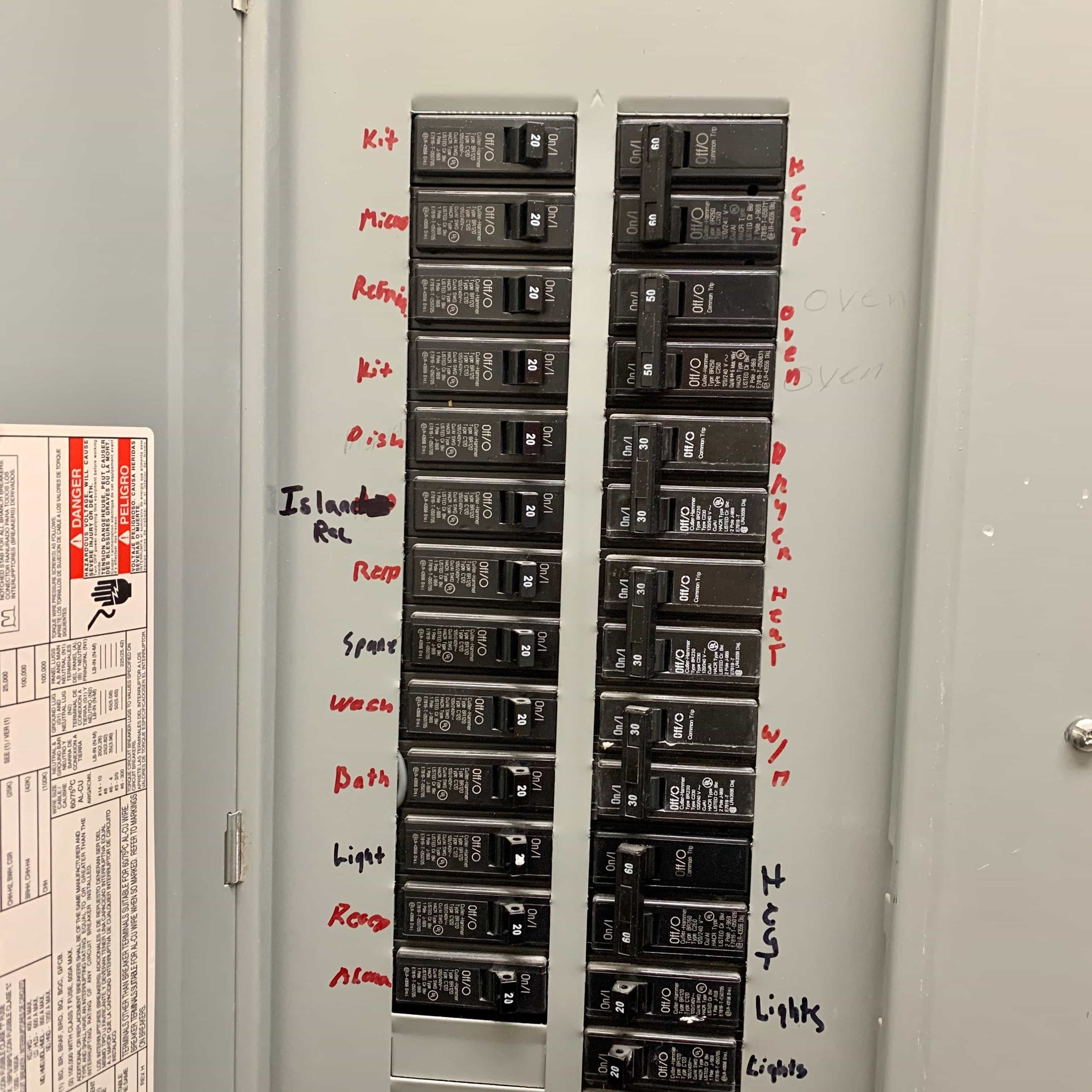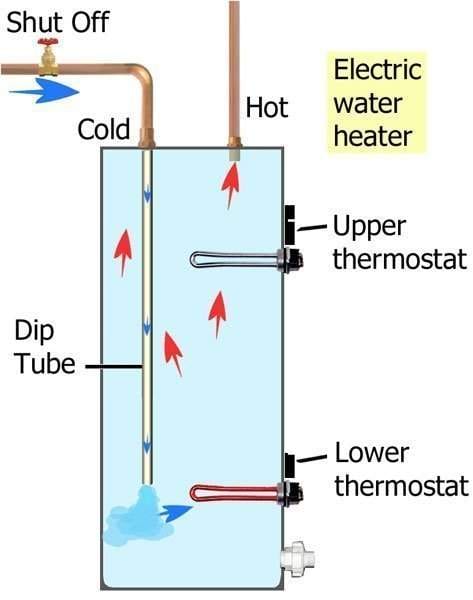Picture this: you’re ready for a relaxing hot shower after a long day, but instead, you’re met with icy cold water. Your water heater circuit breaker has tripped again, leaving you frustrated and shivering.
You’ve checked it before, but it keeps happening. Why won’t it stay on? This annoying issue doesn’t just disrupt your day; it could hint at bigger problems lurking in your home’s electrical system. You might be wondering what causes this inconvenience and how you can fix it without calling in expensive professionals.
Rest assured, you’re not alone, and there are solutions within your reach. By understanding why your water heater circuit breaker keeps tripping, you can not only restore your hot water but also safeguard your home from potential dangers. Stay with us as we unravel the mystery behind this problem, offering insights and practical tips that could save you time, money, and stress. Dive into the rest of the article to discover how to keep your showers hot and your worries cold.

Credit: m.youtube.com
Page Contents
Common Causes Of Circuit Breaker Trips
Experiencing a tripping circuit breaker can be frustrating and inconvenient. Understanding the common causes is essential for a solution. Let’s explore the reasons behind this issue. Knowing these can help prevent future problems.
Overload Issues
Overload issues happen when the water heater draws more power than the circuit can handle. This is a common cause of breaker trips. Too many appliances on one circuit can lead to overloads. Upgrading your circuit or redistributing the load may help. Regular checks can prevent unexpected trips.
Short Circuit Problems
Short circuits occur when wires touch improperly. This can cause your circuit breaker to trip. Damaged insulation or loose connections often lead to short circuits. Regular inspections can catch these issues early. Fixing them can prevent further damage.
Ground Faults
Ground faults happen when electricity takes an unintended path. This can occur if a wire contacts a grounded surface. Ground faults can be dangerous. They may cause electric shocks. It’s important to address them promptly for safety. An electrician can inspect and fix ground faults effectively.

Credit: www.ahs.com
Identifying Signs Of Electrical Issues
Frequent tripping of the water heater circuit breaker signals potential electrical issues. It might be due to a faulty thermostat or a damaged heating element. Regular inspection can prevent hazards and ensure efficient operation.
Identifying electrical issues in your water heater is crucial. These problems can lead to safety hazards and costly repairs. Knowing the signs of electrical issues can help you take action early.Unusual Sounds
Listen for any strange noises from the heater. Clicking or buzzing sounds might indicate electrical troubles. These noises often signal loose connections or faulty wiring. Regular maintenance can prevent further damage.Burning Smell
A burning odor is a serious warning. This smell suggests overheating or burning wires. It can be dangerous and needs immediate attention. Turn off the heater and consult a professional.Frequent Breaker Trips
If the circuit breaker trips often, there’s a problem. It might mean the heater is drawing too much power. This can happen due to faulty components or wiring issues. Contact an electrician to inspect and fix the problem.Troubleshooting Techniques
Experiencing a tripping water heater circuit breaker can be frustrating, but it doesn’t have to be a mystery. By understanding some troubleshooting techniques, you can pinpoint the issue and potentially fix it yourself. Whether you’re dealing with faulty wiring or a malfunctioning component, diving into these practical steps can save you time and possibly a call to the electrician. Let’s explore these methods and see how you can get your water heater back on track.
Inspecting Wiring Connections
Start with the wiring connections. Loose or damaged wires can easily trip your circuit breaker. Carefully examine the connections for any signs of wear, burn marks, or fraying. Ensure all wires are tightly connected and in good condition.
If you spot any issues, you may need to replace damaged wires or tighten loose connections. Remember, safety first! Always turn off the power before inspecting the wiring to avoid any electrical shock.
Testing Circuit Breaker
Next, test the circuit breaker itself. Sometimes, the breaker might be faulty, causing it to trip unnecessarily. You can do this by switching the breaker off and back on to see if it resets properly.
If it continues to trip, consider swapping it with a new one of the same amperage. This simple test can reveal whether the issue lies with the breaker or elsewhere in your system.
Evaluating Water Heater Components
Finally, evaluate the water heater components. Faulty elements or thermostats can draw too much power, leading to a tripped breaker. Check the heating elements for signs of corrosion or damage.
Also, test the thermostat to ensure it’s functioning correctly. You can use a multimeter to check these parts. Replacing faulty components can restore balance to your electrical system and stop the breaker from tripping.
Have you ever wondered why these issues arise in the first place? Could it be a sign of something more significant in your home’s electrical system? By addressing these areas, you not only solve the immediate problem but also gain a deeper understanding of your water heater’s performance. Stay curious and proactive, and you might just become the troubleshooting expert in your household!

Credit: georgebrazilplumbingelectrical.com
Preventive Maintenance Tips
Dealing with a water heater circuit breaker that keeps tripping can be frustrating. Preventive maintenance is key to avoiding such issues. Regular checks and timely upgrades ensure your system functions smoothly. Here are some tips to keep your water heater circuit breaker in top shape.
Regular Inspection
Check your water heater regularly. Look for signs of wear and tear. Examine the wires and connections closely. Ensure there are no loose parts or frayed wires. This simple step can prevent many future issues.
Professional Servicing
Hire a professional for periodic maintenance. Experts can spot hidden problems early. They ensure your system runs efficiently. Professional servicing also extends the lifespan of your water heater.
Upgrading Circuit Breaker Capacity
Consider upgrading your circuit breaker. A higher capacity breaker can handle more load. This is especially useful if your water heater is an older model. Ensure the upgrade meets safety standards. Consult with a qualified electrician for the best advice.
When To Call A Professional
A frequently tripping water heater circuit breaker signals an urgent need for professional assistance. Experts can accurately diagnose and resolve electrical issues. Ensure safety and efficiency by consulting a certified electrician promptly.
When your water heater circuit breaker keeps tripping, it can be more than just a minor inconvenience. You might find yourself repeatedly resetting the breaker, only for it to trip again, leaving you without hot water. At some point, you need to know when it’s time to call in the professionals. Understanding the signs of persistent issues, safety concerns, and complex electrical repairs can save you time, money, and even prevent potential hazards.Persistent Problems
If resetting the breaker becomes a routine chore, it’s time to seek help. A constantly tripping breaker can indicate underlying issues that aren’t going away on their own. Ignoring these signs might lead to bigger problems down the road. Have you ever thought about the potential damage that can happen if the issue persists? A professional can diagnose whether the problem lies with the water heater itself or the electrical system. They bring expertise and tools that you might not have, ensuring a thorough inspection.Safety Concerns
Dealing with electricity requires caution. If you’re unsure about handling electrical components, it’s safer to call a professional. Consider the risk of electrical shocks or even fires. Is it worth the risk to attempt a DIY fix when your safety is on the line? A qualified electrician understands the dangers and takes necessary precautions. They are trained to safely manage and resolve electrical issues, giving you peace of mind.Complex Electrical Repairs
Some problems are more intricate than they appear. Replacing or repairing electrical components isn’t always straightforward. Have you ever tried to read an electrical schematic or wiring diagram? If not, tackling complex repairs yourself could lead to more harm than good. Hiring a professional ensures the job is done correctly. They have the skills to navigate complex electrical systems, saving you from potential headaches and costly mistakes. When faced with these signs, reaching out to a professional isn’t just a smart move—it’s a necessary one. Would you rather spend a bit now to ensure everything’s right, or risk larger expenses and dangers later? Remember, your comfort and safety should always come first.Conclusion
A tripping water heater breaker signals potential issues. Check for overloaded circuits. Inspect for faulty wiring or components. Regular maintenance can prevent future problems. Consider professional help if unsure. Safety should be a priority. Understanding the cause saves time and money.
Troubleshooting isn’t complicated with simple steps. This ensures a reliable water heater. Keep an eye on energy consumption. It might hint at underlying issues. A healthy system enhances home comfort. Stay proactive for long-term efficiency.
